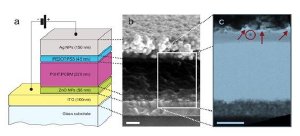IMEC has demonstrated a fully solution-processed organic solar cell with a spray-coated active layer and a metal top contact spray-coated on top. The resulting cell shows power conversion efficiencies above 3%, a performance comparable to organic solar cells produced by spin coating of the organic layer and vacuum evaporation of the top contact metal. This is an important step towards producing organic solar cells with cheap and large-area processes.
Polymer-based (organic) solar cells hold the promise of low-cost production and a high throughput. However, this can only become true if all the layers of the cells can be deposited by solution-based, in-line compatible methods. IMEC's research now shows that spray-coating is a suitable deposition technique, and that it can be used to deposit all layers, including the metal top contact.
Spray-coating is a high-rate, large-area deposition technique that ensures an ideal coating on a variety of surfaces with different morphologies and topographies. It is frequently used for industrial coating and in-line deposition processes. In spray-coating systems, the ink is atomized at the nozzle by pressure or ultrasound and then directed toward the substrate by a gas. An added advantage of spray-coating is that it is efficient: compared to other techniques only a small amount of the solutions are wasted.
IMEC demonstrated that an active layer - a solution of P3HT and PCBM - deposited with spray-coating shows power conversion efficiencies above 3%, a performance which is comparable to that of spin-coated devices. And for the metal top contact, IMEC spray-coated a solution with silver nanoparticles. The challenges are to do this without dissolving the underlying layer, and without damaging it by the temperature needed to sinter the silver nanoparticles. IMEC demonstrated that spray-coating greatly reduces the damage to underlying layers compared to other techniques. It was also able to sinter the silver nanoparticles at 150°C, a temperature that is compatible with processing on flexible substrates.
Tom Aernouts, Teamleader Organic Photovolatics at IMEC: "R&D on organic solar cells has entered the stage where we can consider low-cost high-volume manufacturing, which is essential for the uptake of this technology by the industry. Our results show that IMEC has the expertise and knowhow to play an important role in organic photovoltaics R&D."
 Figure 1 - (a) Schematic build-up of the organic solar cell, (b) SEM and (c) FIB/TEM cross sections of the polymer solar cell with a spray coated Ag top contact.
Figure 1 - (a) Schematic build-up of the organic solar cell, (b) SEM and (c) FIB/TEM cross sections of the polymer solar cell with a spray coated Ag top contact.